Borno’s Christian IDPs (3): Finding Their Way Away From Camps
They had all fled Gwoza Local Government Area in Borno State, Northeast Nigeria, and found their way to the capital city where camps for the displaced were set up. But they ended up not staying in any.
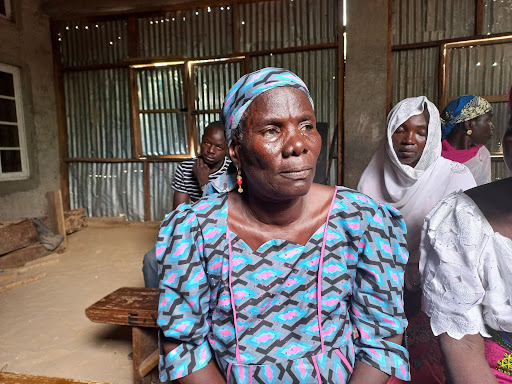
Two women, fiftyish Saratu Yohanna and the much younger Hannatu Yakubu, 34, fled Gwoza Local Government Area (LGA) sometime around 2012 when, guns blazing, Boko Haram insurgents swept through their villages and towns.
Recalling how they ended up sticking together in Shwari, a settlement in Maiduguri, Borno State capital, Northeast Nigeria, Mrs Yakubu explains it this way: “When you run, it’s the companion you find that you make your way to safety with.”
Companionship
Forced out of their homes, the displaced held on to neighbours and fellow Internally Displaced Persons (IDPs) they met along the way. In their desperation, such companionships, particularly in times of grave danger, were cherished and coveted, especially after family members were scattered in all directions. This was how the two women met and remained inseparable ever since.
Gwoza LGA is made up of over 30 towns and villages, such as Agapa Lama, Alau, Amdaga, and Gwoza. For many of those on the run, the famous Mandara Mountains, about 190 km along the northern part of the Cameroon-Nigeria border, was a safe haven. But not for too long.
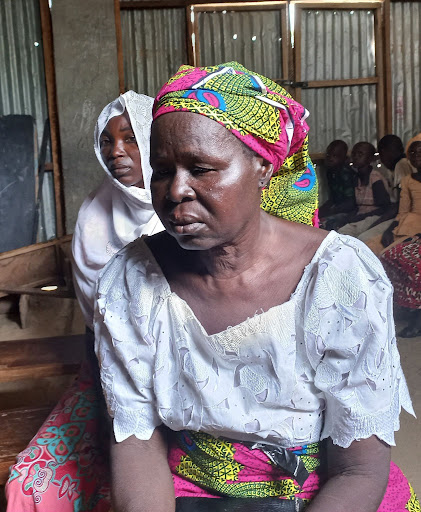
In search of shelter
Dinatu Dauda, in her 60s, had run from her village in Goshe, Gwoza LGA, to the Mandara Mountains. Then she and her eight children lived under a tree for about six months. Her husband had mysteriously gone missing. Till date, they suspect he was captured by Boko Haram.
Eventually, when they found their way to Maiduguri, they were unable to secure accommodation in IDP camps.
Then, “a man called Bulama gave us a place to stay. It has three rooms,” Mrs Dauda narrates.
To make a living, she purchases groceries and sends her children out to hawk. “We live by the day. What is sold the night before becomes food for the next day.”
Sometimes, as their first meal, they get to eat tuwo da miyan kuka (cornmeal and baobab leaf soup) in the evening; sometimes it is in the mornings, and they remain hungry for the rest of the day.
Hunger bites
“When we came to Pulka [a town in Gwoza LGA] it was worse because we didn’t have food to eat. Some days we ate, sometimes we went hungry,” Mrs Yohanna continues.
Then they were lucky to board a bus that carried goods to Bama. That was how they got to Maiduguri.
“We first went to Bakassi camp. When we got a place in Bakassi, we felt discriminated against because we were not getting food. I went a month without getting food there to eat. When I tried to get food just like others, I was not able to.”
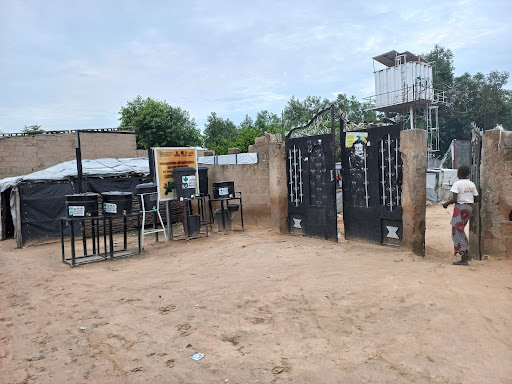
“When we fled, my children and husband all went their separate ways and I had to find my way alone,” Mrs Yohanna says.
But, along with others she had fled with, she was later able to get a place to stay away from IDP camps. “The Red Cross gave us cards and we were able to eat. But now that the Red Cross is gone, it is back to hunger.”
Currently, together with fellow IDPs like Mrs Yakubu, Mrs Yohanna sells groceries. The good news is her husband and seven children found their way to safety too. “But he is helpless,” she adds with a shake of her head, implying that he is unable to farm or find any worthwhile work to do.
Alternative sources of livelihood
Many of the displaced were farmers before the insurgency snatched away their sources of livelihood. Mrs Yohanna’s companion, Mrs Yakubu, also has to make do with buying groceries worth a thousand naira or a little more to resell. “Sometimes it takes weeks to sell them,” Mrs Yakubu complains.
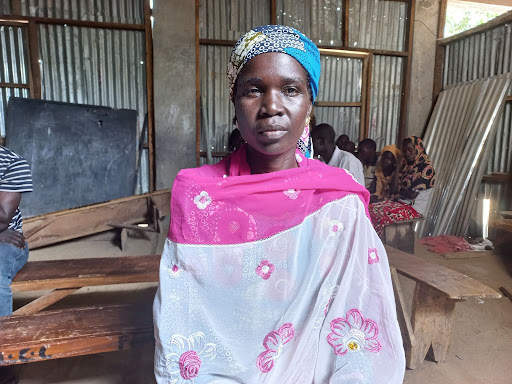
Then there is Mrs Liyatu Iliya, a mother of eight children who makes a living selling groundnuts. She used to be a farmer too.
She also shares similar experience with some of the displaced. “When we left Gwoza, we didn’t get a camp to stay and slept under trees. There was no mat to sleep on or food to eat. We tried to come to Maiduguri and it was difficult to find our way because we were told there was no way,” she tells HumAngle.
“When we finally did, we were kept in an open field in Shwari. We later found a place to stay in Shwari with three other families.”
A commercial motorcycle rider back home in Gwoza, Mr Shadrach Yohanna, 32, now does manual labour. “I was also in GSS Vile, in my final year in secondary school,” he says, a sad smile tugging at his lips.
Mr Yohanna now lives in Shwari Two with his wife and two children.
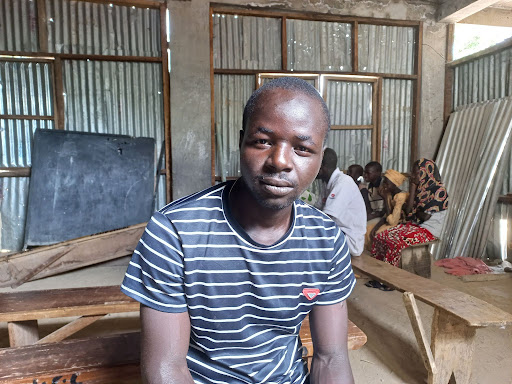
From volunteer to paid service
One of the settlements in Gwoza LGA is Gwoza, named after the area. This is where Ishaya Yohanna, 33, lived with his wife and children before they were forced to flee in 2012.
But they did not leave after the first or second sign of trouble.
“They [terrorists] had been killing us one after the other but we didn’t run. Then they came on a flush out mission,” Mr Ishaya narrates. “I don’t think anyone left with more than the clothes on their backs.”
To make it to safety, Mr Ishaya sought labour at different stages of his journey, paid for transportation, and moved again. “Some were able to get someone who drove all of them in a single vehicle,” he says. “Some camped in Mubi, some in Yola. It depended on where you thought was safer.”
How Mr Ishaya made it out alive is not the same way his parents did, he explains. “The first time I came to a village where Mobile Police had a camp, I got some money and made it to Michika in Adamawa State, then Yola before I made it to Maiduguri.”
At the time, Shwari camp was not constructed and the displaced were not gathered in one place. “Jerusalem [EYN CAN Centre IDP camp] was filled up,” Mr Ishaya says.
So he stayed with one friend after another. “I tried to get a camp to settle but there was no space for me. People in Jerusalem are mainly Christians because we couldn’t stay in general camps. The pressure we got when we lived with others was too much so that it was best we stayed by ourselves. That was how the CAN Centre came to be and it was put under the state government’s care.”
Whenever food or provisions were being distributed in a camp, Mr Ishaya “fought to get a card” which showed he was registered as an IDP and entitled too. “What I got would then be my contribution where I was living as what I brought to the house.”
His first major step to getting employed was volunteering “to work for Christian Aid before they said their contract was terminated.” That was on Dec. 12, 2019. And suddenly, Mr Ishaya was idle again. But a week after, he volunteered again and began work with a Coca-Cola company.
“I was a farmer. Now I work with Coca-Cola,” he says. “I load and offload. For instance, when a trailer of sugar is brought, each bag I carry is 12.74 naira. Every trailer carries about 109 bags. So the money I get is usually multiplied based on what I get per time and I get paid by the end of the month.
This report is a partnership between the African Transitional Justice Legacy Fund (ATJLF) and HumAngle Media under the ‘Mediating Transitional Justice Efforts in North-East’ project.
Support Our Journalism
There are millions of ordinary people affected by conflict in Africa whose stories are missing in the mainstream media. HumAngle is determined to tell those challenging and under-reported stories, hoping that the people impacted by these conflicts will find the safety and security they deserve.
To ensure that we continue to provide public service coverage, we have a small favour to ask you. We want you to be part of our journalistic endeavour by contributing a token to us.
Your donation will further promote a robust, free, and independent media.
Donate HereStay Closer To The Stories That Matter




